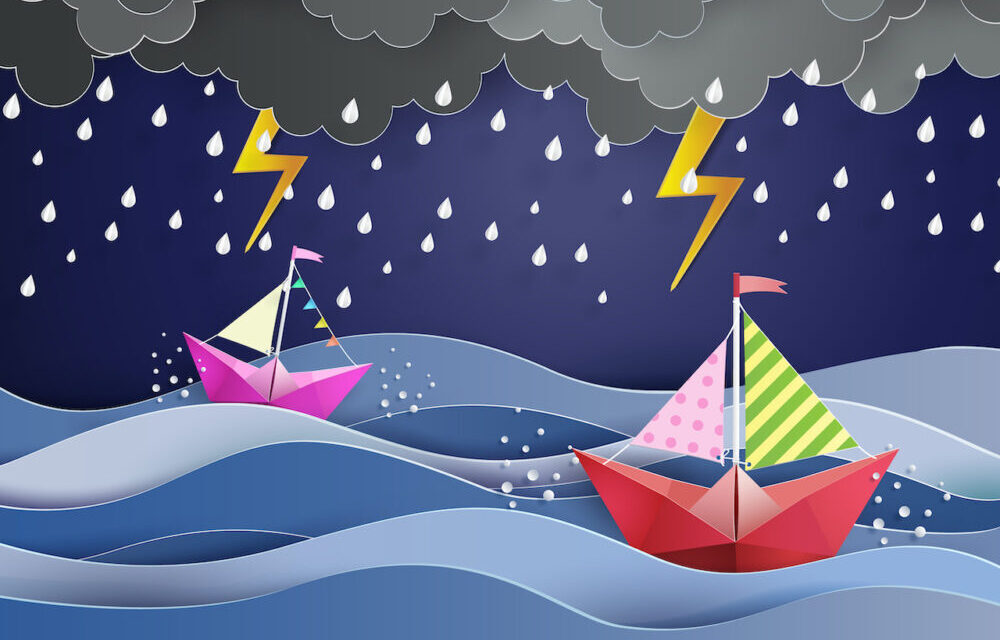The best thing about school for most students is friends. Your friends bring the laughs in class, the support when things go wrong, and the feeling that you belong.
Over time your friendships grow into much more than that. Friendships have an impact on your mental health, your confidence, and who you become as a person. So, it is important you have healthy friendships. But what makes a healthy friendship?
I find it helps to think of friendships as literal friend-ships. Boats that you sail through life in. If you want to know if you’re sailing in the right ships, ask yourself these questions…
1. Is your friend-ship seaworthy?
The first and most important question to ask about any relationship is, do I feel safe with this person? If you don’t, then that’s a deal breaker. Disembark the friendship!
The sorts of behaviours that can make us feel unsafe include:
a. Put-downs, even if they aren’t direct. Sometimes put-downs can look a bit like compliments, but we know they’re not because they make us feel bad. I remember one from when I was at school. A so-called friend said, “You’re quite pretty for someone who is so chunky”. Ouch!
This sort of put-down is designed to keep you small, and you are not small. You are mighty!
b. Conditional friendship. If someone says, or implies, you can only be friends if you go along with what they say or do… they are not your friend. You don’t have to do anything that makes you feel uncomfortable or anything that makes you feel less like you. Good friends give each other space to be themselves.
Kristina Morgan is a clinical psychologist at Lourdes Hill College. She says, “You don’t need to change for fake friends. You turning into someone else will not make them happy or like you more. They are simply not skilled or grown up yet. They’ll get there in their own way, at their own pace. That’s not your job or problem. You can choose who you spend time with. Don’t waste your time with someone who can’t see your awesomeness yet.”
c. Gossip. If a friend gossips about you, they are not your friend. If you tell them something personal and they share that information, then you are not safe with them.
Sometimes friendships are based on gossip and judging other people. Remember, if someone loves gossiping with you, they probably love gossiping about you too. Build friendships on something more worthy than gossip.
2. Is everything a competition in your friend-ship?
A friendship should be calm sailing most of the time. Everything shouldn’t be an uncomfortable competition. We all know those people who relish having more expensive clothes than you, better grades than you, more likes than you on social media, more everything… It’s exhausting!
Good friends celebrate your successes. They are happy when you do well or experience good luck. They don’t try to take the wind out of your sails. The same is also true in reverse. You want to support them, and you are happy for them when things go well.
3. Is navigating your friend-ship fun or stressful?
When you say goodbye to your friends at the end of time together, do you feel good about yourself, or do you feel flat and full of self-doubt? Healthy friendships should boost your sense of wellbeing.
Even if you are an introvert and really love coming home to quiet and your own company, it shouldn’t be because the time in your friendship stresses you out.
If a friend does make you anxious or unhappy, more than just occasionally, you have permission to sail away. You have no obligation to be friends with anyone. However, you should always try to be kind and respectful. You can slowly drift away from a friendship without declaring war on the high seas!
4. Do you trust the crew on board the friend-ship?
A healthy friendship is built with care, trust, and respect. How do you know if all those elements are there? Well, a shortcut is to ask yourself, can I be my most authentic self with this person? Can I take off my mask and stop pretending? Because let’s face it, we all spend too much time pretending.
Think about the people in your life who make you feel seen and heard and enough. It might be a parent, an older cousin, or a grandparent; The people who have loved you forever. That’s the feeling you’re aiming for… the gold standard.
While you’re young most friendships won’t meet that gold standard, but tuck that feeling away and treat it as your compass. Sail towards that feeling and away from anyone who makes you feel unseen, unheard, and worthless.
5. Do you have to stay aboard just one friend-ship?
You can have as many friendships as you like. Some people think you need only one best friend forever, but that is rubbish. We have different friends in different places and at different times in our lives. If you have a friend who doesn’t want you to spend time with others, well, to be honest, that’s just unhealthy!
Healthy friendships are with people you choose to spend time with. However, you are not dependent on one another.
As cold as it sounds, we have different friends for different purposes, and that’s okay. Nobody can be absolutely everything for someone else, not even married couples! You might have some friends for your hobbies like basketball or skateboarding or art, some in a study group, some you share your deepest thoughts with because you trust them completely, and some who share your quirky sense of humour. Make friends everywhere. Have a whole flotilla of friendships!
Kristina Morgan says you should also practice being your own best friend. “Treat yourself as kindly and thoughtfully as you would like a great friend to treat you. If you value yourself, you’re less likely to put up with drama or rubbish behaviour from others”.
6. Will your friend-ship survive stormy seas?
All friendships hit stormy seas sometimes. That is normal. We do not always agree with our friends and sometimes they hurt our feelings. The test of a sea-worthy friendship is how well you can work together to make repairs.
Friendships take a long time to build. They are created by fun and shared experiences, but they are also held together by acts of kindness, mutual support in hard times, and trust.
Sometimes, you might feel the sting of a mean comment or the disappointment of being let down by a friend and you want to abandon ship straight away. Keep your reaction in proportion. Nobody is perfect, not even you!
It is worth assessing exactly how much damage has been done to your friendship. Can it be repaired or is it sunk already? If your friend wants to help you make repairs with healthy and honest communication, maybe give them the benefit of the doubt. Your friendship might be made stronger by the extra work you put in.
Final thought…
Throughout a lifetime, you are going to meet hundreds of thousands of people. A select group of those people will become friends. Hopefully, you will share adventures and a special bond. You will invest a lot of time and life in one another. So, choose wisely. Choose friends you genuinely like and respect. And just as importantly, choose people you like and respect yourself around.
Happy sailing!
This article was first published in Lourdes Hill College’s Inspiring Girls blog.







